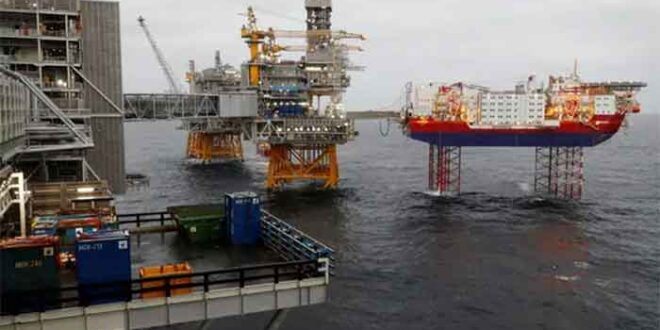Oil and gas workers at state giant Equinor are on strike in Norway, the largest producer of oil and gas in Western Europe. The strike is escalating Europe’s natural-gas crisis a week before a key pipeline with Russia shuts for maintenance. Benchmark Dutch natural gas futures surged 10% on Monday on news of the strike in Norway.
Operator Equinor has initiated a shutdown of three fields in the North Sea as a result of the strike, the company said on Tuesday.
The striking workers are demanding wage increases to deal with rising inflation, which hit 5.7% in May — the highest since 1988, according to Norway’s statistics agency.
The strike that has started on Tuesday is expected to cut Norway’s gas production by 13% from Wednesday. Norway supplies 20% to 25% of EU and UK’s natural-gas demand, according to Norway’s Ministry of Petroleum and Energy.
About 15% of Norway’s offshore oil and gas workers are members of the Lederne labor union that is on strike.
Lederne union members voted down a proposed wage agreement last week. Other oil and gas labor unions in the country have accepted the deal and are not on strike.
The strike is expected to cut Norway’s gas production by 13% and 130,000 barrels of oil by Wednesday, said the Norwegian Oil and Gas Association. A planned escalation by the union on Saturday could cut about a quarter of Norway’s natural-gas output and 15% of its oil production.
The strike comes at a time of tight natural-gas supplies for Europe as Russian state gas giant Gazprom has already cut gas flows to Germany via the key Nord Stream 1 pipeline by 60% from last month, citing an equipment hold-up in Canada as a result of sanctions over the war in Ukraine. The pipeline also supplies other countries in Europe.
Berlin fears the situation may get worse after the pipeline’s scheduled shutdown for maintenance from July 11 to July 21. Germany’s economy minister, Robert Habeck, said last week natural-gas flows may not resume after the scheduled works, which would in turn impact fuel storage ahead of winter, when demand spikes.
Germany — Europe’s largest economy — moved into the second stage of its three-stage emergency gas plan last month after Russia slowed supplies to the country. If the situation worsens, the country may start rationing natural gas in the last of the three-stage plan, as outlined by Germany’s economy ministry.
Under the country’s emergency plan, industry would be first in line for supply cuts. The move could devastate the economy and lead to job losses, Germany business leaders and unions have said.
As energy shipments from Russia have dropped to multiyear lows due to sanctions, some nations’ unwillingness to pay up in rubles and the EU’s overall desire to divest from Russian energy, Norway’s supplies are becoming increasingly important for Europe in times of troubles.
The industrial action began at midnight local time (2200 GMT) at three fields – Gudrun, Oseberg South and Oseberg East – and will expand to three other fields – Kristin, Heidrun and Aasta Hansteen – from midnight on Wednesday.
A seventh field, Tyrihans, will also have to shut on Wednesday because its output is processed from Kristin.
By July 9, Sleipner, Gullfaks A and Gullfaks C would likely stop producing as Lederne members are considered crucial to operations, with potential ripple effects on other fields which pump their product via those fields.
If they did, it could reduce the output of crude and other oil liquids and natural gas output further.
“This is a comprehensive strike, Elisabeth Brattebø Fenne, head of organization and working life in Norwegian oil and gas, told national broadcaster NRK.
Oil Prices Could Surge 240% If Russia Slashes Output In Response To Western Sanctions, Warns JPMorgan
Oil prices could surge 240% to $380 a barrel if Russia dramatically slashes production in response to Western plans to cap the country’s energy prices, JPMorgan has warned.
G7 leaders last week announced they were working on plans to cap the price of Russian oil in an effort to keep up the pressure on Moscow over its invasion of Ukraine.
But JPMorgan’s analysts said in a note this weekend that Russia is in a relatively strong position thanks to the recent increase in oil and natural gas prices.
Moscow could retaliate against the G7 price cap and slash its oil production by as much as 5 million barrels per day without causing excessive damage to its economy, JPMorgan said.
But such a cut would be disastrous for global oil markets, given the supply and demand mismatch that has already sent the Brent crude price up almost 50% this year to around $112 a barrel.
“The most extreme scenario of a 5 million barrel per day slash in production could drive oil prices to a stratospheric $380 a barrel,” JPMorgan’s analysts, led by Natasha Kaneva, said in the note.
The estimate underlines the risks of tightening sanctions on Russia at a time when energy prices are soaring and causing major problems for Western politicians at home.
“Russia’s policymakers will likely address the challenge of the oil price cap from the position of strength,” JPMorgan’s analysts said. “Russia had already showed its willingness to withhold supplies of natural gas to EU countries that refused to meet payment demands.”
JPMorgan said the outlook was uncertain, but a more likely outcome was that Russia cuts its output by 3 million barrels per day, which could push oil prices to $190 a barrel. Production stood at just over 10 million barrels a day in May, according to Moscow financial newspaper Vedomosti.
The G7, which includes the U.S., UK and Germany, are exploring ways to cap Russian prices, including by prohibiting the buying or selling of Russian oil above a certain price. Reports have suggested they could use the UK and Europe’s power over global shipping insurance to help enforce any such cap.
JPMorgan said an alternative outcome was that crude prices stabilized around current levels, with Russia rerouting its oil at lower prices towards Asia and other producers stepping up to fill any production gaps.
 Eurasia Press & News
Eurasia Press & News




